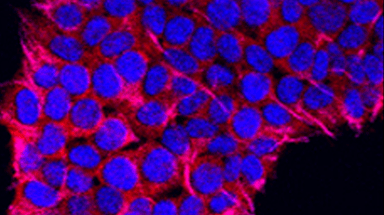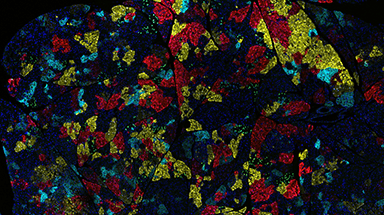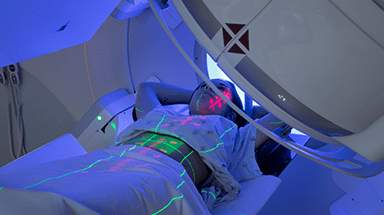UPMC Hillman Cancer Center is part of the UPMC family.

Pancreatic Cancer Care
What Is Pancreatic Cancer?
The pancreas has two jobs:
- It aids in digestion. The pancreas makes digestive enzymes or pancreatic juices. The stomach sends partially digested food to the intestine. The pancreas then releases the enzymes to mix with the food. This is the exocrine function.
- It makes hormones. The pancreas makes insulin and glucagon. Insulin helps manage blood sugar. Glucagon acts to raise blood sugar. This is the endocrine function.
The pancreas has three regions:
- The head is near the upper intestine. It houses the main pancreatic duct that leads to the duodenum.
- The middle section makes up most of the pancreas.
- The tail section is next to the spleen.
Cancer occurs when abnormal cells begin to grow and divide. Doctors classify pancreatic cancer by the type of cells involved: exocrine or endocrine.
Learn why you should choose UPMC Hillman for pancreatic cancer care.
How Common Is Pancreatic Cancer?
Doctors diagnose around 50,000 people a year with pancreatic cancer. Of these, 95% or more have exocrine pancreatic cancer (adenocarcinoma).
About 3% of the total cancer cases per year in the U.S. are pancreatic cancer.
About 7% of cancer deaths are from pancreatic cancer.
The risk of a person getting pancreatic cancer at some point in their life is 1 in 64. Risk factors, ranging from genetics to preventable measures, can affect those odds.
Pancreatic Cancer Causes and Risk Factors
Doctors don't know the exact cause of pancreatic cancer, but risk factors that can increase your chance include:
- Gender. In general, men are more likely than women to get pancreatic cancer.
- Age. 90% of people who get pancreatic cancer are older than 55.
- Genes. Hereditary conditions that increase your risk include pancreatitis, Peutz-Jeghers syndrome, Li-Fraumeni syndrome, and BRACA 2 gene.
- Race. African-Americans have a higher risk of pancreatic cancer than Asians, Hispanics, or whites.
- Chronic pancreatitis. Long-term inflammation of the pancreas increases risk.
- Cirrhosis of the liver. People with cirrhosis have an increased risk.
- Diabetes. People who have type 2 diabetes are at a higher risk than those who do not.
- Family history. The risk of getting pancreatic cancer is higher if a person's mother, father, or sibling had the disease. If your family has a history of pancreatic cancer, you may want to contact a genetic counselor for a screening.
In some cases, people can change their habits or lifestyle to reduce their risks:
- Stop smoking. Heavy smoking increases the risk of pancreatic cancer.
- Keep a healthy weight. People who are very overweight are at an increased risk for pancreatic cancer.
- Get active. A sedentary lifestyle increases pancreatic cancer risk.
- Change jobs. Certain workplace pesticides, dyes, and chemicals may increase the risk of pancreatic cancer.
Contact Us About Pancreatic Cancer Care
To learn more about pancreatic cancer care or to make an appointment, you can:
- Call 412-647-2811.
- Contact a UPMC Hillman Cancer Center near you.

Types of Pancreatic Cancer
Cancer can affect the exocrine or endocrine functions of the pancreas. There are also various types of cancer that can affect the pancreas.
Read about the types of pancreatic cancer.
Pancreatic Cancer Screenings and Exams
You should think about getting screened if you:
- Have a family history of pancreatic cancer.
- Are a male over the age of 55.
- Have diabetes and are over 50 years old.

Pancreatic Cancer Treatment Program
The Pancreatic Cancer Treatment Program creates individual plans to help each patient through diagnosis, treatment, and follow-up.
Learn more about our Pancreatic Cancer Treatment Program.
Treatments for Pancreatic Cancer
There are many treatment options for pancreatic cancer, including:
See pancreatic cancer treatment options at UPMC Hillman Cancer Center. UPMC
UPMC
 UPMC Children's Hospital of Pittsburgh
UPMC Children's Hospital of Pittsburgh
 UPMC Magee-Womens Hospital
UPMC Magee-Womens Hospital

